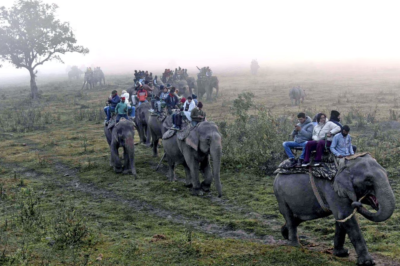
Nestled in the verdant landscapes of Northeast India, Assam beckons travelers with its rich biodiversity, vibrant culture, and sprawling tea gardens. Among its myriad attractions, the elephant safari stands out as a unique and unforgettable experience that draws visitors from across the globe. This adventure offers an intimate glimpse into the diverse wildlife and pristine habitats of Assam, all from the back of one of nature’s most majestic creatures—the elephant.
Assam, home to several national parks and wildlife sanctuaries, including the world-renowned Kaziranga National Park, provides the perfect backdrop for elephant safaris. These gentle giants, revered and integral to Assamese culture, serve as ambassadors to the state’s lush forests and the myriad species that inhabit them. Riding atop an elephant, travelers can venture into areas inaccessible by vehicles, enabling close encounters with the region’s flora and fauna in their natural environment.
The elephant safari in Kaziranga National Park, a UNESCO World Heritage Site, is particularly famous for offering sightings of the great Indian one-horned rhinoceros, a species that has found a safe haven within the park’s boundaries. The park, which harbors two-thirds of the world’s one-horned rhinoceros population, also hosts a variety of other wildlife, including tigers, elephants, water buffaloes, and countless bird species. The experience of silently traversing the tall elephant grass, with the early morning mist enveloping the landscape, creates a surreal and enchanting atmosphere that stays with visitors long after their journey ends.
Beyond the thrill of wildlife sightings, elephant safaris in Assam are a testament to the state’s commitment to conservation and sustainable tourism. The safaris are conducted with utmost respect for the animals and their habitat, ensuring a harmonious interaction between humans and nature. This approach not only enriches the visitor experience but also raises awareness about the importance of preserving these magnificent creatures and their ecosystems.
Moreover, participating in an elephant safari in Assam offers a deeper understanding of the symbiotic relationship between the local communities and their natural surroundings. It provides insight into how elephants have been an integral part of Assamese culture and traditions for centuries, serving in festivals, religious ceremonies, and as a means of transportation. The safari thus becomes a bridge connecting visitors with the cultural heritage and environmental ethos of Assam.
In conclusion, “Assam’s Gentle Giants: Exploring Elephant Safaris in the Heart of Northeast India” highlights the unparalleled adventure that awaits in the lush landscapes of Assam. It is an invitation to step off the beaten path, embrace the tranquility of nature, and witness the majestic beauty of the elephant in its natural habitat. An elephant safari in Assam is not just a journey through the wilderness; it is an experience that captures the essence of this enchanting state, leaving a lasting imprint on the hearts of those who embark on it.








































Leave a Reply